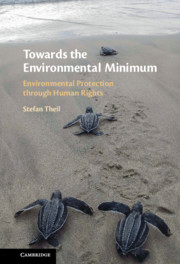Book contents
- Towards the Environmental Minimum
- Towards the Environmental Minimum
- Copyright page
- Dedication
- Contents
- Figures
- Acknowledgements
- Abbreviations
- 1 Introduction
- Part I Introducing the Environmental Minimum
- Part II The Environmental Minimum under the ECHR
- Part III Beyond the European Convention
- 8 International Protection Regimes
- 9 Environmental Constitutionalism
- Part IV Beyond Human Rights Law
- Appendix: Data Methodology
- Bibliography
- Index
9 - Environmental Constitutionalism
from Part III - Beyond the European Convention
Published online by Cambridge University Press: 27 August 2021
- Towards the Environmental Minimum
- Towards the Environmental Minimum
- Copyright page
- Dedication
- Contents
- Figures
- Acknowledgements
- Abbreviations
- 1 Introduction
- Part I Introducing the Environmental Minimum
- Part II The Environmental Minimum under the ECHR
- Part III Beyond the European Convention
- 8 International Protection Regimes
- 9 Environmental Constitutionalism
- Part IV Beyond Human Rights Law
- Appendix: Data Methodology
- Bibliography
- Index
Summary
The chapter discusses the constitutional protections of the environment in two comparatively sophisticated domestic protection regimes. South Africa and Germany represent two broad trends that go beyond the greener interpreation of existing rights through courts. Both have adopted express environmental provisions into their constitutional frameworks: South Africa codified an enforceable, individual right to an environment of a certain quality and Germany introduced a general constitutional mission statement requiring environmental protection and sustainable development. However, as the case studies demonstrate, both approaches have been limited in their practical impact: key conceptual and doctrinal questions remain unresolved and failed to significantly impact environmental regulations. In South Africa, the environmental minimum could contribute towards the development of a principled doctrine on section 24 and clarify its relationship to environmental framework legislation. With respect to Germany, the chief contribution lies in limiting the deference granted to regulators and stimulating the development of clearer positive obligations under fundamental rights.
Keywords
Information
- Type
- Chapter
- Information
- Towards the Environmental MinimumEnvironmental Protection through Human Rights, pp. 215 - 244Publisher: Cambridge University PressPrint publication year: 2021
